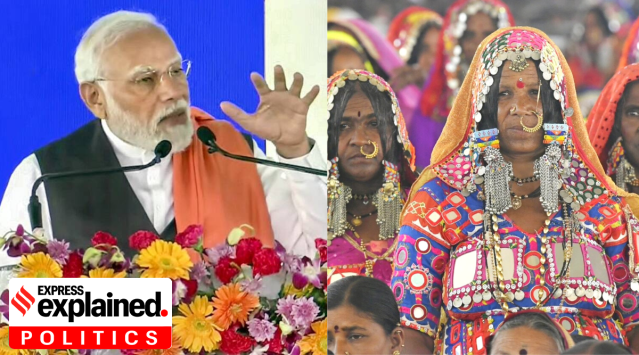Why PM Modi has distributed land title deeds to Banjaras, an SC group in Karnataka
Days before the event, JD(S) leader and former Karnataka Chief Minister HD Kumaraswamy questioned the PM's presence at the event. How have such deeds been distributed in the past, and what has changed in the run-up to state elections in Karnataka? We explain.
 The decision by the BJP government to have the PM distribute these title deeds is being seen in the context of state elections in Karnataka. (Photo via PTI, left, Twitter.com/narendramodi, right)
The decision by the BJP government to have the PM distribute these title deeds is being seen in the context of state elections in Karnataka. (Photo via PTI, left, Twitter.com/narendramodi, right) On Thursday (January 19), Prime Minister Narendra Modi symbolically distributed Hakku Patra (land title deeds) to five families of the Banjara (Lambani) community, a nomadic Scheduled Caste group, at an event organised by the state Revenue Department at Malkhed, in the Kalaburagi district of Karnataka.
The five families were among the 50,000-plus families to whom land title deeds were distributed during the programme. Modi hailed this programme as “a big day” for the community, and alleged that previous governments had done nothing when it came to converting Banjara thandas (habitations) to revenue villages. The Lambanis are traditionally nomadic tribes with a large population in the backward districts of the Kalyana Karnataka region in north Karnataka.
What are hakku patras or title deeds?
A title deed is a property ownership document, and the bearer of the document owns the land. The title deeds enable owners to avail of bank loans with the said document. They will also be eligible to buy or sell land to which the title deed is granted by the government.
Was this done for the first time in Karnataka?
In 2017, the Congress government passed a law that granted ownership of houses to agricultural labourers residing in unrecorded habitations, and it was expected to benefit two lakh people living in Lambani thandas and other settlements of different backward communities, such as Kurubarahattis, Haadis, and Palyas. The Revenue Department said that 300 habitations on government land were being converted into revenue villages.
Back in 2009, the BJP government launched the Karnataka Thanda Development Corporation for the development and modernisation of 3,395 thandas and grants were regularly released for the purpose. According to a response tabled in Lok Sabha, more than Rs 430 cr was released for the development of thandas from 2014-15 to 2018-19. In the past too, title deeds have been provided to various landless groups, including the Banjara community in the state.
What was the controversy over PM Modi distributing the deeds?
Days before the event where PM Modi was scheduled to distribute these title deeds, JD(S) leader and former Karnataka Chief Minister HD Kumaraswamy raised questions on why this was being done by the PM. “Such title deeds are normally distributed by MLAs,” he said. He had also criticised the expenses incurred for the programme, noting that it was funded by the state exchequer.
The decision by the BJP government to have the PM distribute these title deeds is being seen in the context of state elections in Karnataka. Modi is expected to launch more projects in the state in the run-up to the polls due later this year.
The PM has already visited the state twice in January and more visits by him are lined up in the coming months, where he is expected to inaugurate a slew of projects, including the Bengaluru-Mysuru expressway, a new metro line, an airport at Shivamogga, among others.
Many have drawn parallels with the election campaign carried out in Gujarat last year for the 2022 state elections, where the PM was seen distributing appointment letters to candidates selected for government jobs. Opposition parties had said this was usually done by under-secretary-grade government officials.
What do the numbers say about the Banjara community?
The Banjaras are a key scheduled caste sub-group in Karnataka, although they are considered to be a tribal group in terms of the lives they lead. The Scheduled Castes and Scheduled Tribes together make up nearly 24 per cent of the state population, becoming an important group for political parties like the BJP.
In October last year, the BJP announced a two per cent hike in government reservations for jobs and education for Scheduled Castes, taking the reservations for the group from 15 to 17 per cent in the state. The efforts to woo and consolidate the support of the SC/ST community are seen as part of efforts by the BJP to compensate for a possible division of its Lingayat caste support base in Karnataka and to prevent SC/ST groups from drifting their support to the Congress – which has traditionally enjoyed the backing of Other Backward Classes, the SC/STs and minorities.
The Lingayats, who make up nearly 17 per cent of the state population and have supported the BJP in recent years, are currently seeing a demand within some in the community (a sub-sect) for higher quotas.





- 01
- 02
- 03
- 04
- 05

































